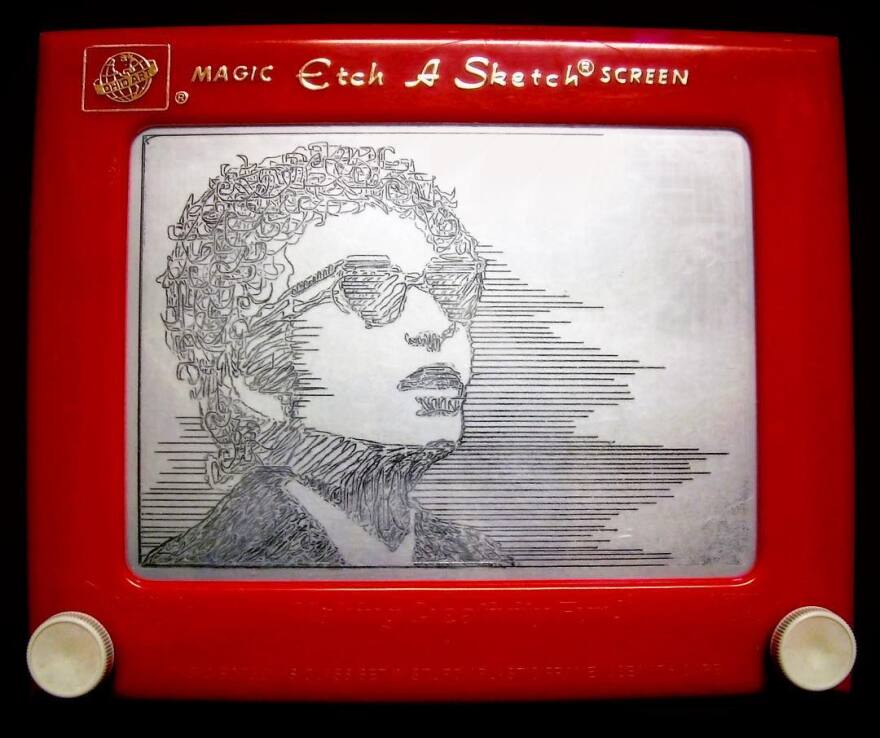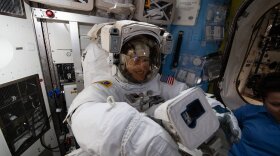Zena Cardman knew she might not have another opportunity to pursue poetry. She was about to dive into graduate research on microbiology in extreme environments when she put that plan on ice, and opted to write a poetry collection for her undergraduate thesis at the University of North Carolina at Chapel Hill.
She paired that love of investigation and art to receive a master’s in marine science with a minor in creative writing. An extremophile, Cardman was naturally attracted to space exploration, and in 2017 she beat the odds was accepted into that year’s class of NASA astronaut candidates. Now flying supersonic jets, backpacking through the canyons of Utah and practicing her dexterity with the International Space Station’s robotic arm, Cardman uses her artistry to share the experience. She has an affinity for fine-tuned mechanics that is as clear in her poetry as it is in her Etch a Sketch portraits and the automotive repair videos featured on her Instagram.
Host Anita Rao talks with Zena Cardman about the scientific and philosophical importance of the International Space Station and returning to the moon. Astronaut candidate Zena Cardman speaks at UNC-Chapel Hill’s Memorial Hall on Wednesday, Nov. 6 at 5 p.m.
INTERVIEW HIGHLIGHTS:
On transitioning from scientist to astronaut:
I was a microbiologist by training and got to go to all of these far-flung places like the Arctic and Antarctica, and I loved the science there. But I equally loved the operational side: The logistics of planning for how you go to these places that are so wild and remote and then working in these tight-knit groups of people who are all there for one cause. And I just thought that the space program seems like the ultimate field research. So when the application opened in 2015 — I think in December — it was actually the first time that I met the bare minimum requirements. And I thought, you know, I'll try this out, see how it goes. It'll be a good test drive, and I'll apply again the next time.

On balancing her creative and logical strengths:
I love existing in both worlds … I think they've actually both guided me in the same direction. Science for me is very much about exploring our world, our universe and figuring out how things work and what our place is here. And also writing is about exploring our world and our universe and our place in it. So I think it's really approaching the same questions just from slightly different angles.
On the best part of astronaut training:
It's different every day. I have no standard schedule. Our training is everything from learning Russian language to learning how to operate the robotic arm — all of the engineering systems onboard the Space Station. We learn how to do spacewalks. We put on the spacesuit in a giant swimming pool.

It's called the Neutral Buoyancy Lab in Houston, a little bit outside of Johnson Space Center. You know, it's hard to train for being in a weightless environment when you're here on Earth, obviously, but a swimming pool is a great way to do that. If you've ever been underwater, you feel like you're floating. And so we can take these 300-plus pound space suits [with] a combination of styrofoam and weights placed all around. It's this amazing art form. These scuba divers come and do this, and they weigh you out in just a way that you're perfectly neutrally buoyant in every axis... It's really cool. But even cooler to me is that we also have a life size mock-up of the space station underwater in this pool.
I haven't had a scary moment per se. I think sometimes, for me, the scariest moments are doing public speaking. - Zena Cardman
On what she expects to do as an astronaut:
My class is about to graduate, but we have no idea what vehicle will be flying on, and to me, that's actually one of the most exciting things. You know, it could be that we fly on a Soyuz, like we've been flying for the last several years as NASA astronauts, but we also have these commercial vehicles that are coming online now … And we also have the new Artemis mission. We are going to the moon in 2024, and that is such a wild thrill to be in an office where I am working with the people who will go to the moon.
On the continued importance of space exploration:
All of the research that we do in space has huge implications for life on Earth. We have satellites that are observing our weather and helping you get to work in the morning with your GPS. We do research on the space station about bone density loss, and that, of course, is relevant for astronauts who are up there for a long time, but it's also valuable for osteoporosis on Earth ... Apollo was a really audacious goal ... We had to do things like make computers smaller and more robust, and so that drove development of the integrated circuit. And now you have a cell phone that has as much computing power as the Apollo program did. It's amazing. So I think I don't even know what benefits we’ll get from it. But by setting these goals, it will ultimately drive some incredible discoveries.





